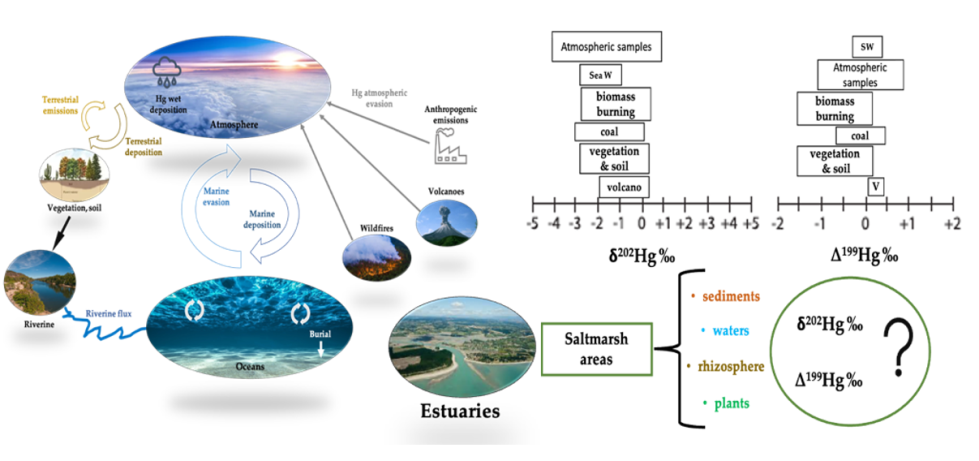
Doctoral Themes - Proposals
Unravelling the biogeochemical cycling of mercury in estuarine environments using mercury stable isotopes as source tracers
Supervisors
Rute Cesário, rute.cesario@tecnico.ulisboa.pt
Holger Hintelmann, hhintelmann@trentu.ca
Registration Institution
Instituto Superior Técnico (Universidade de Lisboa)
Project description
Mercury (Hg) contamination poses a significant threat for human health and natural ecosystems at local, regional and global scales. Although man-made Hg emissions have increased dramatically in the last decades, natural emissions contribute substantially to its overall global inventory and fluxes. This poses a considerable challenge for regulators tasked with managing Hg in the environment, as it is often impossible to distinguish natural from anthropogenic sources. Thus, a detailed understanding of Hg biogeochemical cycle is crucial, but not always sufficient. The use of Hg isotope ratio technologies is a new promising tool to trace Hg sources and to gain new insights into their relative status to the total Hg transport and fate.
This research plan will combine field studies with laboratory experiments to investigate how specific environmental processes control Hg isotope fractionation patterns. Natural Hg isotope ratios in sediments and waters of two estuarine ecosystems with different Hg inputs will be determined. Saltmarshes will be priority areas where Hg isotope ratios will be also analysed in rhizosphere, roots and plant aerial parts during bioaccumulation. Laboratory experiments will be conducted to evaluate the Hg toxicokinetic and toxicodynamic in the plants. The impacts of climate changes in saltmarsh degradation, and consequently in Hg recycle, will be addressed. Additionally, Hg isotope ratios will be determined in water samples from saltmarshes and outer areas to clarify the role of saltmarsh plants in the transport and fate of Hg to the estuarine and adjacent coastal areas, and evaluate these contributions to the regional Hg cycle.
Keywords
Mercury isotope fractionation; Estuarine ecosystems; Saltmarsh plants; Mercury cycle; Ecosystem degradation
Societal Challenges
This proposal is an interdisciplinary project on environmental sciences supporting excellent research with crucial impact on society and economy. This work plan is aligned with the CQE activity plan, namely with the Thematic Lines and strategic objectives, as well as with the Sustainable Development Goals (SDGs) of the United Nations Agenda 2030 (namely 13th, 14th and 15th goals), the Water Framework Directive, that implements necessary measures to prevent deterioration of transitional and coastal water bodies, the European Union regulations concerning Hg (e.g. 2017/852), with the goals of the Minamata Convention on Hg and with Horizon 20-30 of EU. The strengthen cooperation among thematic lines, poles and groups of CQE will be also foreseen with this proposal. This work plan is aligned and will be developed within the scope of one of the Doctoral Programs of IST.

Check other proposals from this and the other thematic lines:




